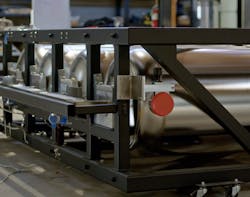Verne Receives Investment from Amazon and United Airlines to Advance Cryo-Compressed Hydrogen Technology for Heavy-Duty Fleets
Verne, a developer of high-density hydrogen storage systems, has announced a strategic fundraising round to accelerate the development of its cryo-compressed hydrogen (CcH2) technology for onboard hydrogen storage in heavy-duty vehicles.
Trucks Venture Capital led the fundraising, and participating investors included Amazon's Climate Pledge Fund, United Airlines Venture Sustainable Flight Fund, Newlab, and Collaborative Fund.
“Heavy-duty vehicles like semi-trucks and cargo handling equipment are vital to the functioning of our economy, but they are also some of the worst polluters. Verne is motivated to provide zero-emission solutions that don’t require these critical industries to make costly performance trade-offs,” said Ted McKlveen, Co-founder & CEO of Verne.
Heavy-duty transportation is responsible for creating 12% of all US greenhouse gas emissions, and regulations - such as California's Advanced Clean Fleets and individual corporate net zero commitments - are requiring many to make the transition to zero-emissions vehicles.
However, while many companies are interested in making the switch, factors such as large energy requirements, the total cost of ownership, and performance tradeoffs make it difficult for fleets to transition from diesel to zero-emission technologies.
For example, many existing Class 8 Battery Electric trucks provide a limited range of about 200 miles, weigh up to 10,000 pounds more than a diesel truck (reducing payload availability to haul cargo by up to 15%), and can take over two hours to recharge. With these barriers to entry, hydrogen is presenting itself as a solution to decarbonizing vehicles that are required to travel long distances or carry heavy payloads.
Despite these benefits, current hydrogen trucks still fall short of diesel-truck performances in certain areas. This is where Verne hopes to make an impact with its latest round of funding.
Verne's cryo-compressed hydrogen technology involves cooling and compressing hydrogen to achieve the maximum internal density of 79 g/L - a 33% improvement over liquid hydrogen and an 87% improvement over traditional 700 bar compressed gas hydrogen. This increased density leads to a greater range and payload, with Verne's technology enabling semi-trucks to achieve over 900 miles of range without adding any weight to the system.
“Amazon views cryo-compression as a promising hydrogen storage solution,” said Nick Ellis, a Principal at Amazon’s Climate Pledge Fund. “We believe cryo-compression can provide economic and operational advantages that will play an important role in the transition to zero-emission fleets.”
In 2023, Verne completed the first testing of its CcH2 storage system on board a vehicle as part of its participation in the Breakthrough Energy Fellows program. This on-vehicle testing validated the performance of the company's sub-systems - including direct integration with the vehicles' fuel cell - and confirmed the improved hydrogen density relative to the standard 700 bar compressed gas hydrogen storage method.
These technical results will prepare Verne to meet the commercial interest it has received from trucking fleets and OEMs, as well as lead partners across aviation, ports, mining, and hydrogen distribution and refueling.
“Heavy-duty vehicles like semi-trucks and cargo handling equipment are vital to the functioning of our economy, but they are also some of the worst polluters. Verne is motivated to provide zero-emission solutions that don’t require these critical industries to make costly performance trade-offs,” said Ted McKlveen, Co-Founder and CEO of Verne. “Bringing on new strategic investors, and strengthening our partnership with existing investors, will help us accelerate our path to market and decarbonize this critical industry.”





